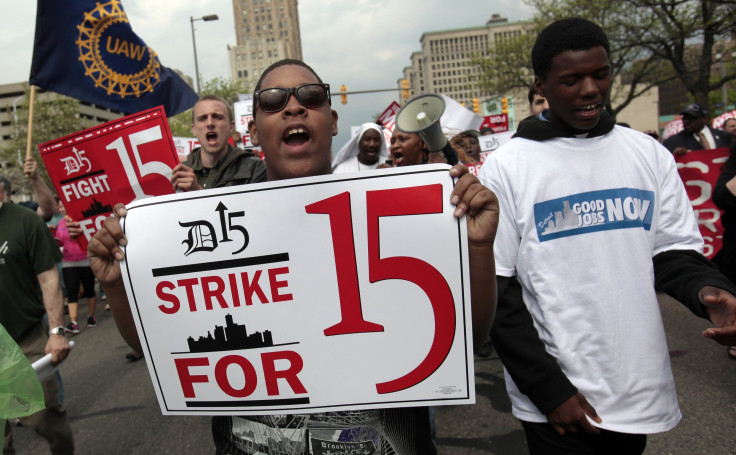Michigan Bill Would Wipe Out Local Control Of Labor Standards Like Minimum Wage, Paid Sick Leave

Stymied on the federal level by Republicans in Congress and on the state level by the GOP’s grip on governorships and legislatures, labor advocates increasingly are looking toward local units of government to enact their agenda -- things like a higher minimum wage or mandatory paid leave. Now, conservatives and business groups in Michigan are fighting back.
The Local Government Employer Mandate Prohibition Act would nullify nearly all local labor standards that are higher than the state’s and prevent any future attempts from cities to put such measures into place. Backed by a bevy of business groups including the restaurant lobby, chambers of commerce and the nonunion builders and contractors association, the state House approved the bill last month. It now sits in a committee in the Republican-dominated Senate.
“Hopefully we can pre-empt local laws on all labor standards, but in particular, wage and benefit issues,” said Justin Winslow, spokesman for the Michigan Restaurant Association. “We don’t think it’s the proper purview of local government.”
Fuming progressives call the proposal “the death star bill.”
“Living in a state where Republicans are in control, our only option is to pass local ordinances,” said Danielle Atkinson, a Michigan activist who backs paid parental leave.
Outcry last month prompted the bill’s supporters to remove a provision that would have undercut municipal anti-discrimination measures for LGBT workers. But other controversial items remain: bans on local minimum wages, paid leave policies and so-called ban-the-box measures that limit the ability of employers to ask prospective hires about their criminal records would all be outlawed.
“This legislation is an unprecedented intrusion into the local control of Michigan communities,” said Nathan Triplett, the mayor of East Lansing, a liberal town of roughly 50,000 that’s home to Michigan State University. Triplett also serves as vice president of the Michigan Municipal League, a statewide coalition of cities and towns that opposes the bill.
Triplett criticized how the potential law could interfere with the award of city contracts. East Lansing, he said, typically sets wage floors for construction bids, but would be barred from doing so under the proposed legislation. The mayor also said he’s interested in the possibility of a regional wage hike, but laments, “The passage of this bill would prevent that conversation from ever happening.”
Ellen Bravo, executive director of Family Values At Work, which advocates for paid leave policies, criticized what she deems the hypocrisy of the bill’s Republican backers: “When conservatives claim a deep-seated respect for local control, this belies that.”
Supporters like the bill's sponsor Rep. Earl Poleski said it’s about regulatory cohesion: In other words, it's confusing -- and burdensome -- for businesses to operate with one set of rules in Detroit, and another in Kalamazoo. Responding to criticism, Poleki said he values "local control" but not by government. "It means control by employers working with employees," he said, and more competition and investment ultimately strengthens communities.
But Bravo said the bill is in direct response to the “momentum of our movement,” pointing to ongoing efforts to pass paid leave policies in Spokane and Los Angeles. In 2013, New York City passed an earned sick time law, requiring some employers to pay up to 40 hours of paid sick leave per year.
A Michigan Senate committee is expected to take up the measure in coming weeks, observers said. Republican Gov. Rick Snyder has not yet indicated his stance. “Should it be approved, we will give it a thorough review,” said David Murray, the governor’s deputy press secretary.
© Copyright IBTimes 2024. All rights reserved.






















